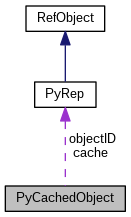|
EvEmu
0.8.4
11 September 2021
|
|
EvEmu
0.8.4
11 September 2021
|
#include "CachedObjectMgr.h"

Public Member Functions | |
| PyCachedObject () | |
| ~PyCachedObject () | |
| void | Dump (FILE *into, const char *pfx, bool contents_too=false) |
| PyObject * | Encode () |
| PyCachedObject * | Clone () const |
Public Attributes | |
| int64 | timestamp |
| uint32 | version |
| uint32 | nodeID |
| bool | shared |
| PyRep * | cache |
| bool | compressed |
| PyRep * | objectID |
Definition at line 125 of file CachedObjectMgr.h.
| PyCachedObject::PyCachedObject | ( | ) |
Definition at line 591 of file CachedObjectMgr.cpp.
Referenced by Clone().

| PyCachedObject::~PyCachedObject | ( | ) |
| PyCachedObject * PyCachedObject::Clone | ( | ) | const |
Definition at line 608 of file CachedObjectMgr.cpp.
References cache, PyRep::Clone(), compressed, nodeID, objectID, PyCachedObject(), shared, timestamp, and version.

| void PyCachedObject::Dump | ( | FILE * | into, |
| const char * | pfx, | ||
| bool | contents_too = false |
||
| ) |
Definition at line 639 of file CachedObjectMgr.cpp.
References cache, compressed, PyRep::Dump(), nodeID, objectID, PRIu64, shared, timestamp, and version.

| PyObject * PyCachedObject::Encode | ( | ) |
Definition at line 778 of file CachedObjectMgr.cpp.
References cache, PyRep::Clone(), compressed, PyTuple::items, new_tuple(), nodeID, objectID, shared, timestamp, and version.
Referenced by CachedObjectMgr::GetCachedObject().


| PyRep* PyCachedObject::cache |
Definition at line 145 of file CachedObjectMgr.h.
Referenced by Clone(), Dump(), Encode(), CachedObjectMgr::GetCachedObject(), and ~PyCachedObject().
| bool PyCachedObject::compressed |
Definition at line 147 of file CachedObjectMgr.h.
Referenced by Clone(), Dump(), Encode(), and CachedObjectMgr::GetCachedObject().
| uint32 PyCachedObject::nodeID |
Definition at line 141 of file CachedObjectMgr.h.
Referenced by Clone(), Dump(), Encode(), and CachedObjectMgr::GetCachedObject().
| PyRep* PyCachedObject::objectID |
Definition at line 148 of file CachedObjectMgr.h.
Referenced by Clone(), Dump(), Encode(), CachedObjectMgr::GetCachedObject(), and ~PyCachedObject().
| bool PyCachedObject::shared |
Definition at line 142 of file CachedObjectMgr.h.
Referenced by Clone(), Dump(), Encode(), and CachedObjectMgr::GetCachedObject().
| int64 PyCachedObject::timestamp |
Definition at line 137 of file CachedObjectMgr.h.
Referenced by Clone(), Dump(), Encode(), and CachedObjectMgr::GetCachedObject().
| uint32 PyCachedObject::version |
Definition at line 138 of file CachedObjectMgr.h.
Referenced by Clone(), Dump(), Encode(), and CachedObjectMgr::GetCachedObject().